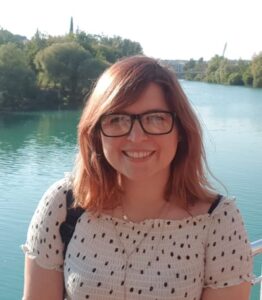From Industry to Academia – A Change in Direction
 When I applied to the MRC Human Genetics Unit (HGU) PhD programme I was already working as a Research Assistant at the HGU but my path up to that point hadn’t been very direct.
When I applied to the MRC Human Genetics Unit (HGU) PhD programme I was already working as a Research Assistant at the HGU but my path up to that point hadn’t been very direct.
When I left university with an honours degree in Cell Biology, I was ready to enter the workforce. I wanted to apply what I had learned and gain work experience so that I could keep my options open for the future. Getting a job in science straight out of university proved challenging, as most entry level positions required at least a year’s worth of experience working in a lab. I was delighted when I was offered a job at a pharmaceutical company developing cancer immunotherapies. I’d always wanted to work in cancer research and working as a Production Scientist, I’d get the opportunity to formulate treatments for patients with advanced cancer.
Going into this I was totally naïve. I knew I’d be working in a cleanroom, but I didn’t appreciate what that involved. A one minute media change required hours of material disinfection and preparation, environmental monitoring, and being covered from head to toe in sterile garments. This was crucial as vulnerable patients on the other side of this process would be receiving live cell therapy treatments.
I was working to Good Manufacturing Practice standards, learning about clinical trials and quality management systems. The skills I was developing were leading me down a different career path than I’d envisioned.
Realising that I wanted to be more directly engaged with the science behind what I was doing, I moved on to working for a company reprogramming somatic cells to induced pluripotent stem cells (iPSCs) from patients with a wide range of genetic diseases for disease modelling. I really loved working with iPSCs and I was always looking for opportunities to get more involved with research and development.
While working in industry, people talked about how hard it was to switch from industry to academia. But, I was certain that I wanted to pursue a career in research, so I applied for a Research Assistant position at the HGU.
I came to the HGU to work on a cross-disciplinary project for Dr. Ava Khamseh, in Dr Luke Boulter’s lab, utilising CRISPR-Cas9 editing, molecular barcoding and single cell-RNA sequencing to model mutational trajectories in early oncogenesis.
I felt really connected to what I was doing, and even on those inevitable days when something was proving to be difficult, I still felt fulfilled by my work. I didn’t find the switch between environments as jarring as I’d been warned it would be: it was intense and varied but I was surrounded by friendly, motivated people and I was constantly learning from them.
I knew now that I wanted to have a long term career in research and I wanted to be able to pursue my own research questions. For that, a PhD felt like the right path.
I applied to the HGU programme because I am interested in disease modelling and in the interplay between fundamental and translational biology. Working here, I found it to be a lively and supportive environment that really values cross-disciplinary collaboration. I wanted to take advantage of the programme structure to explore different areas of research before settling into my PhD.
Already, in my rotations, I’ve had the opportunity to work in different areas of research with different model organisms, and I’ve discovered new things that I’m interest in.
I don’t regret not taking a more direct route to my PhD as all my experiences have been valuable and I’ve gained confidence through working in different environments.



